The following are extracts from the text of a press release from the Pew Hispanic Center entitled “Net Migration from Mexico Falls to Zero—and Perhaps Less“, by Jeffrey Passel, D’Vera Cohn and Ana Gonzalez-Barrera: The largest wave of immigration in history from a single country to the United States has come to a standstill. After […]
How much drugs money is laundered in Mexico each year?
Despite this being an obvious question, there is no simple or generally accepted answer! However, a document published last month by Centro de Estudios Sociales y de Opinión Pública de la Cámara de Diputados (CESOP), entitled Lavado de dinero: indicadores y acciones de gobierno binacionales (“Money Laundering: bi-national indicators and government actions”) does offer some […]
Mexico’s Volcanic Axis
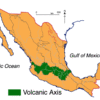
Mexico’s active seismic zones have created numerous volcanoes, many of which are still active. Virtually all the country’s active and recently dormant volcanoes are located in a broad belt of high relief which crosses Mexico from west to east: the Volcanic Axis (see map). Altitudes in this region vary from a few hundred to several […]
In just 20 years, Mexico has gone from a nation that needed to import less than 400,000 metric tons of corn (maize) a year in order to satisfy its domestic market to one where, in the 2011-12 season, it will need to import almost 10,000,000 tons. One producers’ organization, Mexico’s National Confederation of Maize Growers […]
How has the movement of tectonic plates affected Mexico?

In a previous post, we identified the tectonic plates that affect Mexico. In this piece, we look at some of the major impacts of Mexico lying on or close to so many different plates. To the east of Mexico, in the last 100 million years, outward expansion from the Mid-Atlantic Ridge (a divergent boundary) first […]
Two major earthquakes jolted western Mexico (11/12 April 2012)
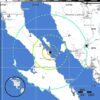
Two major earthquakes in two days! Fortunately, they struck in different sections along Mexico’s west coast, meaning that few if any people were shaken by both. The first earthquake struck in Michoacán on 11 April, and was felt over a wide area of central Mexico. This earthquake registered 6.5 on the Richter scale (preliminary estimates […]
A recent report from researchers at the National Autonomous University of Mexico (UNAM) and the Metropolitan Autonomous University (UAM) confirms that the height of the water table below Mexico City is dropping by about one meter a year, as more water is pumped out of the aquifer than the natural replenishment rate from rainfall. About […]
Mexico’s political system at the state and municipal levels
In a previous post – Mexico’s political system: the basics – we looked at the country’s federal political system. In this post, we look at how the political system works at the two other levels of government: state and municipal. According to the Constitution of 1917, powers not granted to the Federal Government are reserved […]
Greenpeace demands action to clean up Mexico’s surface waters
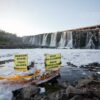
Greenpeace activists chose the Juanacatlán Falls (“The Niagara of Mexico”) for their latest protest to call attention to the poor quality of Mexico’s rivers and lakes. They cited government statistics that show 70% of Mexico’s surface water is contaminated. Most of the pollution comes from industrial dumping, rather than municipal sewage. It is hard to […]
Which tectonic plates affect Mexico?
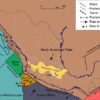
The theory of plate tectonics suggests that the earth’s crust or lithosphere is from 5 to 65 km (3 to 40 mi) thick and divided into about a dozen large tectonic plates, tabular blocks that drift across the Earth in different directions and at various speeds (up to a few centimeters or inches per year), […]
In a few months time, Mexicans go to the polls to elect a new President. Just how does the Mexican political system work? As a build-up to the important federal elections coming shortly, this post looks at the background to Mexico’s political system and provides a quick summary of the federal level of government. A […]
The eruption of El Chichón volcano in 1982
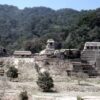
Not all volcanoes give any warning of impending activity. Exactly thirty years ago, just before midnight 28/29 March 1982, the El Chichón volcano in Chiapas erupted completely without warning and with unexpected fury. Two further eruptions followed in early April. The lack of warning caused heavy loss of life among local villagers who had been […]
A matter of scale: Mexico compared to Spain

Scale matters, especially when two countries or regions are going to be compared. A case in point is depicted on this Mexican airmail stamp from 1977 issued to celebrate the resumption of diplomatic relations between Mexico and Spain. Mexico had broken off relations with Spain in 1939 at the end of the Spanish Civil War […]
Suburbia in Mexico: Alejandro Cartagena’s images of Monterrey

What do Mexican suburbs look like? What is their function? As the country’s towns and cities continue to expand, new suburbs appear on their outer edge. Some are gated communities, generally aimed at high income families; these suburbs sometimes include private schools and sports clubs. Other suburbs offer smaller homes aimed at low-income families. Photographer […]
Mexico has more World Heritage sites than any other country in the Americas
The status of World Heritage site is a UNESCO (United Nations Educational, Scientific and Cultural Organization) denomination. The status is conferred on selected sites under the terms of “The Convention Concerning the Protection of the World Cultural and Natural Heritage”, adopted at UNESCO’s 17th General Conference in November 1972 and subsequently ratified by 189 member […]
How does money laundering work, and what is being done about it?
How is drugs money laundered? Drug funds have allegedly financed hotels, car dealerships, bus companies, airlines, casinos, beauty salons, skyscrapers and restaurants, as well as the lavish lifestyles of individual cartel members who acquire gold jewelry, expensive cars, vehicles, yachts and planes. “Trade-based laundering” is on the rise. Drug cartels are reported to be increasingly […]
Map of Oaxaca state, with an introduction to its geography
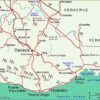
The state of Oaxaca is Mexico’s fifth largest state, with an area of 93,793 square kilometers (4.8% of the national total) and Mexico’s tenth most populous state, with 3.8 million inhabitants in 2010. The state has considerable variety in terms of relief, climate and natural vegetation, and has about 570 km of shoreline bordering the […]
Mexico City has largely escaped drug violence
Previous posts have analyzed drug war death rates in Mexican states, cities over 500,000, the most violent municipalities and areas of particular interest to expatriates. This post focuses on Mexico City or D.F. (Distrito Federal). We focus on D.F. because the rate of drug war deaths is exceptionally low there, less than one eighth the […]
Artificial reefs are usually created by sinking a ship (after it has been thoroughly cleaned to prevent any toxic substances from entering the marine environment) or some other massive metal or concrete structure. Marine sediments gradually collect in, on, and around the objects, which are rapidly colonized by marine life. For rapid reef building, individual […]
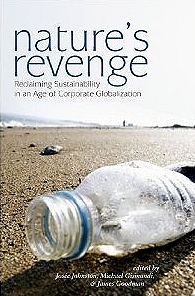
In a previous post–The development of Huatulco, the tourist resort in southern Oaxaca–we looked at how the tourist resort of Huatulco was created by Mexico’s National Tourism Development Fund (Fonatur) on a series of small bays in the state of Oaxaca. Clearly, this development was very much “top-down” and it has been widely criticized from many […]
Drug war death trends in areas of Mexico of interest to foreign tourists and retirees
Non-Mexicans are far more interested in some parts of Mexico than others. These areas of interest may be well-known tourist destinations, have thousands of expatriate residents or are located on major expatriate travel routes. Mexico’s major cities, which are also of interest to foreigners, were discussed in a previous post. This post focuses on 24 municipalities […]
Mexico and USA sign agreement for development of Gulf of Mexico oil reserves

The USA and Mexico share the Gulf of Mexico, with periodic arguments about the precise offshore limits of each country’s jurisdiction. An earlier post includes a brief summary of the history of negotiations over this contentious maritime boundary: Mexico and USA agree to talk about oil rights in the Gulf of Mexico’s “Western Doughnut Hole” […]
Drug war impacts extend to child arrests, border tunnels and stressed zoos
More children being arrested One extremely unwelcome development in the war on drugs is that an increasing number of young adolescents (aged 11 to 17) are involved in drug smuggling and related activities, according to U.S. Drug Enforcement Administration and U.S. Immigration and Customs Enforcement (ICE). Most of the children are Hispanic, and many hold […]
Which Mexican communities have the highest drug war death rates?
In a previous post we noted that big Mexican cities with populations of over 500,000 have drug war death rates about 40% higher than the rest of Mexico. However the highest rates of all are in small northern municipalities which have experienced very high levels of drug violence. Mier, Tamaulipas was the most dangerous municipality […]
Drug war deaths in Mexico’s biggest cities
Drug war deaths occur in communities of all sizes, but they are a bit more likely in the biggest cities. However, there are gigantic geographic variations. For example, Acapulco, with a population of about 790,000, had 795 drug war deaths in 2011 (Jan–Sept) [note 1] while there were zero drug war deaths in Mérida, with […]
Can Mexico’s decline in cacao production be reversed?
In a previous post, we looked at The geography of cacao production in Mexico. and saw how the area under cultivation and production have both fallen sharply since 2003. This post examines two recent projects that aim to reverse this recent trend of a steep decline in Mexico’s cacao production. Major organic cacao project The […]
Mexico’s crime statistics: fishing for the facts
Diego Valle-Jones’s blog, “Food and Fishing“, is actually more about Mexican crime rates than food and fishing! The blog, described by the author as “mainly about data analysis, programming and statistics, with the occasional interspersed post about food” has numerous posts analyzing the drug war in Mexico. These posts focus partly on geographic patterns of where […]

No one doubts the need for reforestation in Mexico. Since colonial times, huge swatches of the country have been denuded of their native vegetation. Recent figures from INEGI suggest that Mexico has lost almost 50% of its native forests due to logging and clearance for farming and settlement. The majority of this loss is in […]
Recent geographic trends in Mexico’s drug violence
Drug related violent deaths during the first nine months of 2011 increased by about 13% compared to 2010. Data released by the Office of the President in January 2012 indicate that from January through September 2011 Mexico had a total of 12,903 drug war deaths. This is a rate of about 15.3 per 100,000 people […]
Eco-tortillas: an environmentally friendly way to make Mexico’s staple food

Mexican scientists continue to find ways to improve the humble tortilla, one of the essential components of Mexican cuisine and a major source of calcium for many Mexicans. We described two years ago how researchers at the Autonomous Metropolitan University of Mexico (UAM) had reduced pollution from the making of corn tortillas. This month, a press […]